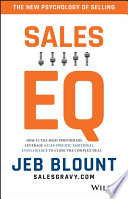

Emotional Intelligence (EQ) is the ability to recognize, understand, and manage our own emotions and the emotions of others. In the context of sales, having a high EQ allows sales professionals to connect with clients on a deeper level. This connection is essential for building trust and rapport, which are critical components of a successful sales process. Sales EQ emphasizes that sales is not just about the product or service being sold; it is about understanding the emotional needs and motivations of the customer. By developing emotional intelligence, salespeople can better navigate complex interactions, respond to objections empathetically, and ultimately close more deals.
Continue readingEmpathy is a core component of emotional intelligence and plays a vital role in sales. It involves the ability to put oneself in the customer's shoes and understand their feelings and perspectives. In 'Sales EQ', the author argues that empathy allows salespeople to identify customer pain points more effectively and tailor their approach accordingly. By actively listening and showing genuine concern for the customer's needs, sales professionals can create a more personalized experience that resonates with the client. This not only enhances customer satisfaction but also fosters long-term relationships that can lead to repeat business and referrals.
Continue readingTrust and rapport are foundational elements in any sales relationship. 'Sales EQ' highlights that emotional intelligence is key to establishing these elements. When salespeople demonstrate authenticity, transparency, and empathy, they create a safe environment for clients to express their concerns and needs. Trust is built over time through consistent and sincere interactions, and once established, it can significantly reduce the perceived risk of purchasing decisions. The book provides strategies for sales professionals to enhance their trust-building skills, such as being reliable, following through on promises, and maintaining open lines of communication.
Continue readingSales can be a high-pressure environment, and emotions can run high during negotiations or when facing rejection. 'Sales EQ' emphasizes the importance of managing one's emotions to maintain professionalism and effectiveness. Sales professionals are encouraged to develop self-awareness, which is the ability to recognize one's emotional triggers and responses. By managing their emotions, salespeople can remain calm and composed, even in challenging situations. This self-regulation allows them to think clearly, respond thoughtfully, and avoid reacting impulsively, which can lead to better outcomes in sales interactions.
Continue readingSocial skills are an integral part of emotional intelligence and are crucial for successful selling. 'Sales EQ' discusses how strong social skills enable sales professionals to communicate effectively, collaborate with others, and navigate social complexities. The book outlines various social skills that can enhance sales performance, such as effective communication, active listening, and conflict resolution. By honing these skills, salespeople can engage with clients more meaningfully, address objections more skillfully, and ultimately create a more positive sales experience.
Continue readingSelf-motivation is a key driver of success in sales. In 'Sales EQ', the author explains that motivated salespeople are more likely to set ambitious goals, persist through challenges, and maintain a positive attitude. Emotional intelligence plays a role in self-motivation by helping individuals understand what drives them and how to harness their emotions to fuel their efforts. The book encourages sales professionals to cultivate intrinsic motivation by aligning their goals with their values and passions, which can lead to greater job satisfaction and improved performance.
Continue readingThe book concludes with the introduction of a Sales EQ framework that integrates the concepts of emotional intelligence into a practical approach for sales success. This framework serves as a guide for sales professionals to assess their emotional intelligence skills, identify areas for improvement, and implement strategies to enhance their effectiveness. By following this framework, salespeople can systematically develop their emotional intelligence, leading to improved relationships with clients, increased sales performance, and greater overall success in their careers.
Continue readingThe reading time for Sales EQ depends on the reader's pace. However, this concise book summary covers the 7 key ideas from Sales EQ, allowing you to quickly understand the main concepts, insights, and practical applications in around 23 min.
Sales EQ is definitely worth reading. The book covers essential topics including Understanding Emotional Intelligence in Sales, The Role of Empathy in Sales, Building Trust and Rapport, providing practical insights and actionable advice. Whether you read the full book or our concise summary, Sales EQ delivers valuable knowledge that can help you improve your understanding and apply these concepts in your personal or professional life.
Sales EQ was written by Jeb Blount.
If you enjoyed Sales EQ by Jeb Blount and want to explore similar topics or deepen your understanding, we highly recommend these related book summaries:
These books cover related themes, complementary concepts, and will help you build upon the knowledge gained from Sales EQ. Each of these summaries provides concise insights that can further enhance your understanding and practical application of the ideas presented in Sales EQ.